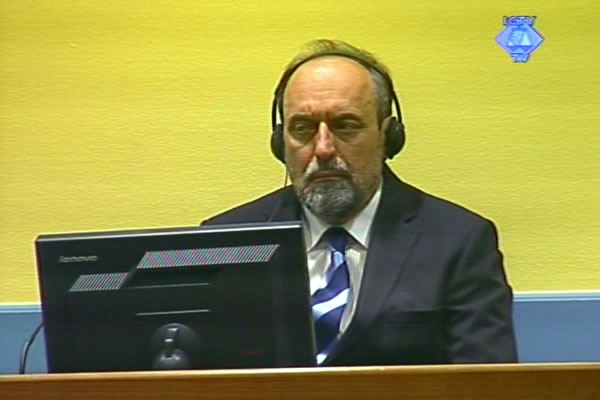Home
TIME OF EUPHORIA AND ANARCHY
Protected witness GH 023 described at the trial of Goran Hadzic how in a ‘time of euphoria and anarchy’ in Baranja ‘old debts were settled’ and how anyone with a weapon felt they had the right to ‘arrest, beat up and abuse’ non-Serbs
 Goran Hadzic in the courtroom
Goran Hadzic in the courtroom Witness GH 023 testified at the trial of Goran Hadzic, former prime minister of the Serb Autonomous Region of Eastern Slavonia under the pseudonym and with image and voice distortion to protect his identity. The witness described the escalation of the situation in Baranja, the process of arming of the Serbs, the strengthening of the Serb Territorial Defense and the capture of villages and towns. He recounted how those events affected the everyday life of the non-Serbs. Goran Hadzic is charged with the crimes in Baranja from 25 June 1991 to the end of 1993.
The witness said that by mid-September 1991 the structure of the population changed abruptly. People started ‘arming up’. The process spun out of control. Since ‘anyone could get a weapon’ it was difficult to rule the region, the witness said. When the civilian authorities, the Serb Territorial Defense staffs and the local police were formed, the situation ‘got more stable’, he said.
The non-Serbs in Baranja were ‘under constant pressure. People were killed and expelled’. At first the police didn’t do anything to prevent the crimes. Later, the police went out in the field, established the identity of the victims and filed criminal reports against unknown perpetrators. However, ‘it didn’t go beyond that’, the witness noted. According to him, ‘it was a time of euphoria and anarchy, people carried arms and were ready to do everything, everybody was afraid of everyone’.
According to the witness, everyone who had a weapon considered they had the right to arrest the non-Serbs. People exploited this situation to ‘settle old debts’. The reasons for the arrests were ‘banal’: being a member of the Croatian Democratic Union party, having ‘desirable’ property or leaving Baranja, which was interpreted as joining the Croatian armed forces. Every day non-Serbs were taken to police stations where they were abused and beaten up. ‘Nobody was responsible for those people. Anyone who was in the mood could come to the detention unit and abuse them’, the witness said. In the SUP yard, the witness saw prisoners showing ‘evidence’ of abuse: bruises and cuts. According to the witness, one detainee died of the beatings. Others were luckier and were released after a few days. About 50 or 80 of them were transferred to a prison in Borovo. As a result of that situation those who remained in their homes got scared and decided to leave.
The prosecutor showed a series of documents to the witness which all indicate that the municipal authorities in Beli Manastir had made ‘lists of the undesirable people’ with the names of ‘those who are engaged in the enemy army and their families’. Those people were laid off or transferred to worse jobs to create the space for ‘Serbs responsible for liberating Baranja’, the witness explained. His testimony continues tomorrow.
Linked Reports
- Case : Hadzic
- 2013-05-28 KNIN AND PALE RECEIVED FUNDS ‘EXCLUSIVELY FROM BELGRADE’
- 2013-05-10 ARKAN ‘WAS SUBORDINATED TO JNA AT SOME POINTS IN TIME’
- 2013-05-02 EUROPEAN MONITOR TESTIFIES ABOUT CRIMES AGAINST CROATS
- 2013-06-18 PATTERN OF PERSECUTION AND KILLINGS
- 2013-07-15 EXCLUSIVE RIGHTS TO FILMING ‘NEIGHBORS FIGHTING A WAR’
- 2013-07-17 AN EYE FOR AN EYE, A TOOTH FOR A TOOTH
